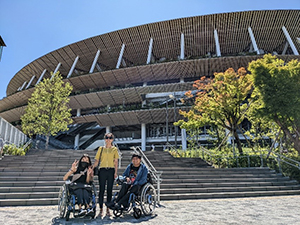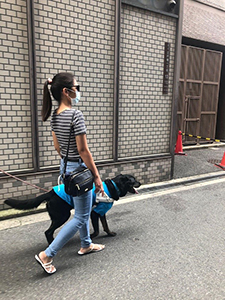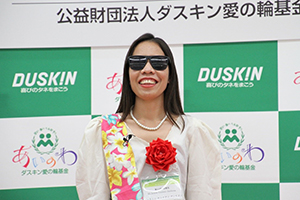Final Report
Jasmin's Final Report
Growth and self-discovery, are the two most valuable things that Duskin Leadership training in Japan has provided me. This training has been filled of new experiences and learnings that I will never forget and shaped me to be a better leader for the community of persons with disabilities.
Due to the spread of the COVID-19, our training was delayed for almost two years. That’s why, we were the first batch of trainees who got the chance to study Japanese online before coming to Japan. It was fun learning from our teachers and getting to know them. However, I was so afraid that the training will be totally canceled because of the pandemic. So, it was such a relief when we finally got in Japan last April, 2022.
The first thing that I’ve noticed when I got out of the airport was, there were braille blocks everywhere. It made me so happy because it makes it easier for me as a blind person to travel independently. Traffic lights also make sounds and almost all of the elevators announce the floor stops and have braille writings on them. The system put in place in every train station to support people with vision impairment and wheelchair users is also impressive. The staff are always ready to assist people with disabilities in every station.
My first month in Tokyo was spent in learning the Japanese language, Japanese braille and doing orientation and mobility. It felt so liberating when I can finally go to the train station on my own. After that, we had our group training.
In our group training, we learned more about the UNCRPd, the different movements for persons with disabilities that were done in Japan and the social welfare support for persons with disabilities. We also learned about the past and current situations of different disabilities here in Japan and the actions that are being done to support them and how the problems are being addressed. We also studied about employment, education and different laws for persons with disabilities in Japan. We trainees also get to visit and observe different barrier-free places in Tokyo such us the Japan National Stadium.

It was fascinating to learn about the different supports that the government provides such as the medical and financial support. Persons with disabilities also have access to a free helper guide or support for a number of hours every month. These things enable persons with disabilities to live independently. The group training was a good experience because I was able to gain more knowledge about other disabilities apart from people with vision impairment. It also made me realized how much I want to make a change for the PWD community in the Philippines. It would be great if PWDs in my country can also get to experience this kind of support from the government and from the people.
During our group training, I was also able to make friends and connect with people in Tokyo outside the training. I joined running clubs such as Achilles International Japan and Banban club. I attended their walking and running activities almost every weekend where in you get to partner with a sighted person to run or walk with you. I also tried doing blind Yoga for the first time. We don’t have these activities for people with vision impairment in the Philippines so I’m happy to get to experience them.
When my individual training started in July, I was given the chance to visit different organizations and go to different places in Japan. The focus of my training plan was around employment for persons with disabilities, accessibility and disability inclusion. So, my first individual training was with Assistive Technology Development Organization (ATDO) where I learned about the importance of accessible books and how to create my own DAISY book. I also attended Disability Equality Training where I learned about effective facilitation techniques with regards to disability inclusion. It was a very useful skill to learn especially because I want to do disability awareness raising in the Philippines.
After that, I visited organizations that are providing employment support for people with vision impairment around Tokyo. I also got the chance to visit NHK and talk to a blind journalist and to some of their human resource staff about the disability inclusion efforts particularly around employment and accessibility that are being done by NHK. Japan has a good disability support in place but, I have found out on my individual training that finding and retaining employment is still a big problem for persons with disabilities. That is why, learning about the inclusion efforts that are being done in NHK was refreshing for me.
The first organization outside Tokyo that I went to was Nippon Lighthouse Welfare Center for The Blind in Osaka. I have learned a lot there about braille and audio book production, library system, guide dogs and I got to interview people about their employment experiences as a person with disability in Japan. I also visited the Rehabilitation Center for the Visually Impaired of Nippon Lighthouse and learn about their ICT trainings and employment support. I was also able to visit the National Museum of Ethnology where people with vision impairment can touch the art exhibits to have a full immersive experience. Lastly, I was welcomed to a homestay in Kyoto during the Bon Holiday where I did weaving and pottery.

It was in Osaka that I first experience going to the hotel restaurant and have breakfast on my own. My first time to go to a convenient store and buy my own food and go to the training location, Nippon Lighthouse, by myself. Go out with a club and do tandem biking for the first time. For many, these are just simple things that they do on their day-to-day lives but for me, it was not ordinary. It gave me the feeling of freedom and the happiness that I felt on those simple achievements was something I will never forget. I was glad to realize that I have the courage to do all of those things.
At Uni, in Kyoto, I have learned about services for deaf and hard of hearing people particularly captioning. I have also visited universities and got to observe their disability support activities. The following month, I went back to Osaka to visit Muchu Center. I have learned a lot about independent living and got the chance to spend time with people with different physical disabilities. They have helped me to understand that asking help for the things you can’t do does not mean that you are not independent. Asking help is not shameful and people will not always judge you for it. That you don’t always have to be perfect for the society to accept you. In Muchu Center, everyone can be just themselves and live a happy and fulfilled life even with their disabilities. This is one thing I want to bring home to my country.
The last part of my individual training was done in Shizuoka Prefecture. I spent two weeks in WITH learning about how they give job support for people with multiple disabilities. They use different devices so people with disabilities are able to do their jobs effectively. I got to experience doing those jobs such as packing souvenirs, counting electric parts, making brailed name cards etc. It was a very good program and I wish Philippines has that too.
After finishing my individual training in November, I went back in Tokyo for another group training. We have learned about action plan development which I think is very useful to keep track of our goals. We were also given a class about how to create an effective project proposal. This one is very important to learn especially when most of us are planning to start a project after returning to our own countries. We also got the chance to visit the Nippon Foundation and learn about their amazing programs. Lastly, we had our final presentation for Tokyo. It made me so nervous because it was a 15-minute presentation in Japanese and I have to memorize all of my lines since I can’t read fast in Japanese braille. It was a good feeling when I was able to do the presentation.
The places that I went to, the trainings I have attended and the people that I’ve met along the way will forever be in my heart. The word “thank you” is not enough to express my gratitude to the Daskin Ainowa Foundation, JSRPD and all the organizations who took care of me during the period of this training.





